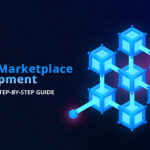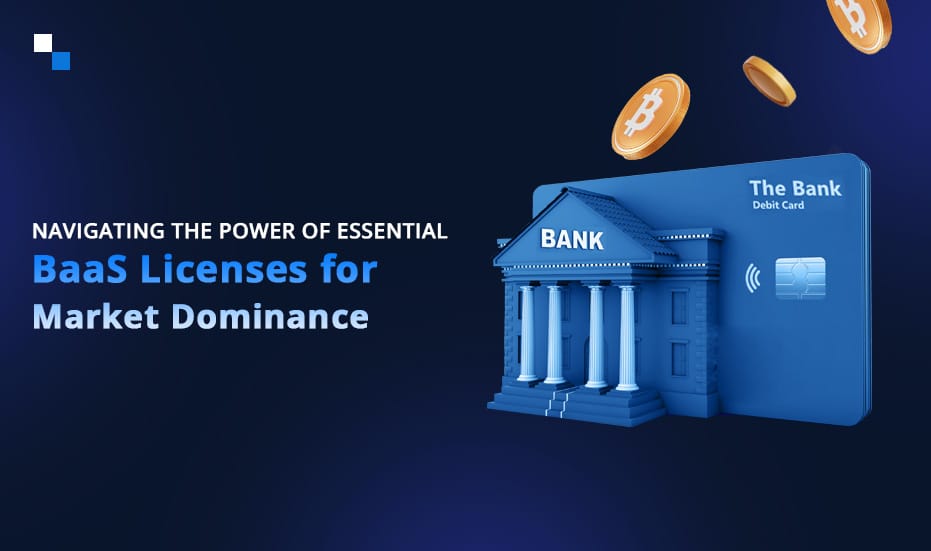
Developing DEX on SUI With White Label Exchange Platform: Your Guide for 2025
December 26, 2024
A Step-by-Step Guide to DePIN Marketplace Development
December 27, 2024Banking-as-a-Service (BaaS) is experiencing a meteoric rise, propelled by the surging demand for integrated financial solutions across diverse sectors. The BaaS ecosystem is rapidly expanding, with a growing number of providers, especially in competitive regions such as the U.S., where acquiring a banking license is an intricate and costly venture. BaaS software platforms leverage the infrastructure of licensed banks to deliver a spectrum of financial services, including lending, payments, and account management, without necessitating their own banking charter.
However, navigating the landscape of BaaS licenses is where the real competitive advantage lies. The ability to secure and integrate the right licenses can help your platform stay ahead of the curve in a saturated market. It positions you as a legitimate, compliant, and trusted player, ensuring that you not only meet industry standards but also stand out amidst rising competition. For investors looking to capitalize on this shift, understanding the intricacies of licensing is paramount. Thus, scroll through the article to know everything about licenses required before hiring a Banking as a service solution provider.
Why Do Smart Investors Prioritize Licensing in BaaS?
Securing the right licenses while you are planning to get a feature-rich BaaS software platform developed is a cornerstone for the credibility and sustainability of any BaaS venture. However, there are certain things that every investor must prioritize—that is licensing. This requires your attention and consideration before committing capital. Scroll down to check why this is mandatory and what it brings to your table-
- Ensures Regulatory Compliance : Proper licensing ensures adherence to financial regulations, mitigating legal risks and protecting investments.
- Builds Market Trust : Licensed BaaS solution providers inspire confidence among users and partners, enhancing brand reputation and long-term growth potential.
- Facilitates Seamless Operations : Licenses provide legal authorization for core functionalities like payments, lending, and crypto banking services, enabling uninterrupted operations.
- Unlocks Global Market Access : With region-specific licenses, businesses can expand across geographies while complying with local laws.
Investing in well-licensed Banking-as-a-Service (BaaS) solution providers is a step toward ensuring scalability, reliability, and profitable outcomes in the financial ecosystem. In addition to this, there are a few licenses that are crucial to remember for a successful journey.
10 Essential Licenses To Know Before Investing In BaaS Software Platforms
1. Core Banking Licenses
Partnering with a licensed bank as a service (BaaS) solution provider is vital to access core banking functionalities such as account creation, payment processing, and lending services. These licenses ensure compliance with financial regulations and enable BaaS platforms to offer a full range of services while maintaining the necessary security and regulatory framework. Without a core banking license, businesses would be restricted in the types of financial services they can provide, hindering their ability to scale and serve customers effectively.
2. ECB (European Central Bank) Licenses
An ECB license is essential for BaaS software platforms operating within the European Union. It ensures compliance with stringent regulatory standards, including capital adequacy, liquidity, and risk management. With an ECB license, your platform gains legitimacy, enabling you to offer banking services such as payments and deposits across the EU while maintaining customer trust and meeting necessary financial requirements.
3. Electronic Money Institution (EMI) License
An EMI license is essential for businesses intending to issue e-money or provide digital wallet services. This license is especially important for fintech startups and BaaS software platforms looking to facilitate secure, digital transactions. It ensures that businesses can legally offer digital payment services while adhering to the necessary AML and customer protection standards. Without an EMI license, businesses would struggle to offer seamless and compliant e-money services, limiting their market reach.
4. Payment Institution License
Businesses offering payment gateways, remittances, or other transaction-related services must secure a payment institution license to meet regional compliance standards. This license enables BaaS software platforms to process payments, transfer funds, and facilitate cross-border transactions. It ensures that the business meets essential regulatory requirements like safeguarding customer funds and complying with anti-fraud measures, which is crucial for building customer trust and avoiding legal issues.
5. Data Protection Compliance
Regulatory frameworks like GDPR or CCPA mandate robust data security and privacy protocols for businesses handling sensitive customer information. Compliance ensures that BaaS software platforms protect customer data, preventing breaches and ensuring confidentiality. Adhering to these regulations not only helps businesses avoid penalties but also builds customer trust, which is vital for maintaining long-term relationships in the financial services industry.
6. Non-Banking Financial Company (NBFC) License
An NBFC license is often required by businesses offering loans, credit facilities, or other non-banking financial services. This license helps businesses expand their offerings beyond traditional banking services without needing a full-fledged banking infrastructure. It enables BaaS platforms to provide financial products like credit lines, personal loans, or asset-backed lending, giving businesses the flexibility to serve a broader customer base.
7. Fintech Compliance Certifications
Fintech compliance certifications cover a wide range of areas, including data security, user protection, and compliance with industry-specific regulations like PCI DSS for secure transaction processing and KYC/AML adherence. These certifications are critical for ensuring that BaaS platforms meet industry standards and offer secure services to their customers. Compliance also helps businesses build credibility in the competitive fintech landscape and ensures that customers’ financial information is handled securely.
8. Cryptocurrency Licenses
For businesses offering crypto banking services and digital asset transactions, cryptocurrency licenses are required to ensure legitimacy and compliance with local regulations. These licenses provide the legal framework for businesses dealing with cryptocurrencies, ensuring they meet regulatory requirements related to AML, fraud prevention, and secure transactions. Acquiring a cryptocurrency license enables businesses to offer blockchain-based financial services confidently and legally.
9. KYC and AML Certifications
Meeting Know Your Customer (KYC) and Anti-Money Laundering (AML) requirements is critical for businesses providing white-label crypto bank solutions. These certifications help ensure that the business follows due diligence practices, preventing fraud, money laundering, and financial crimes. With robust KYC and AML certifications, BaaS platforms can demonstrate their commitment to customer security, compliance, and regulatory adherence, making them more trustworthy in the eyes of investors and customers alike.
10. Country-Specific Financial Licenses
Regulations differ globally, requiring businesses to obtain region-specific licenses. For example, the U.S. mandates state-wise Money Transmitter Licenses, while Europe often requires PSD2 compliance for payment services. Navigating these varied licensing requirements is essential for businesses operating internationally. Obtaining the necessary country-specific licenses ensures compliance with local regulations and enables BaaS software platforms to offer services in multiple jurisdictions without risking legal or operational issues.

Partnership with Licensed Banking-as-a-Service (BaaS) Solution Providers
Collaborating with established, licensed BaaS providers streamlines access to necessary licenses and reduces the complexity of obtaining them. These providers offer pre-approved infrastructure that can be integrated into your platform, eliminating the need for businesses to handle the licensing process from scratch. By partnering with a licensed BaaS solution provider, businesses can focus on scaling their operations, reducing time-to-market, and ensuring that they are compliant with all relevant regulatory requirements from day one.
It seems that you are now prepared for the investment and that it is going to be a wise decision for your venture. But have you ever wondered about how renowned Baas providers help you create successful platforms? Scroll down to check their strategic approach!
How To Get Started With BaaS Software Platforms?
Step 1 : Strategic Partnership Formation
The initial step in BaaS development involves establishing a robust partnership between Banking-as-a-Service (BaaS) solution providers and licensed financial institutions. This partnership ensures access to regulated banking infrastructure, licenses, and compliance protocols. BaaS software platforms are then integrated with these established banking systems, forming the backbone of the service architecture.
Step 2 : API Integration and Customization
BaaS providers enable seamless integration of APIs that grant access to core banking functionalities, such as account creation, payment processing, and loan management. These APIs are customizable to suit the unique needs of businesses, ensuring they can offer tailor-made financial solutions while maintaining a secure connection with the bank’s systems.
Step 3 : Regulatory Compliance and Security Framework
Ensuring compliance with KYC, AML, and data protection regulations is crucial in the highly regulated world of crypto banking services. Experienced BaaS providers implement advanced security protocols and monitoring systems to protect both customer data and financial transactions, adhering to global compliance standards.
Step 4 : Platform Integration and User Experience Optimization
Following integrating the core banking functionalities, businesses focus on embedding these services into their platforms, enhancing the user interface and experience. A white-label crypto bank solution allows companies to customize the banking interface to match their brand’s identity, ensuring end-users a seamless and intuitive experience.
Step 5 : Scalable Deployment and Continuous Monitoring
The final step involves deploying the BaaS solution and scaling it as required. Continuous performance monitoring is essential for ensuring the service operates efficiently and securely. BaaS software platforms offer real-time analytics to track usage, identify trends, and optimize the service continuously to meet evolving market demands.
What is the Cost of Acquiring Licenses for BaaS?
The cost of acquiring licenses for Banking-as-a-Service (BaaS) is influenced by several factors, including the regulatory environment, the type of license required, and the geographical location in which the BaaS provider operates. Different jurisdictions have varying financial regulations, and acquiring a full banking license typically incurs higher costs due to the stringent capital requirements and compliance processes. Moreover, obtaining licenses for specific financial services like payments, lending, or crypto banking may involve separate fees, depending on the scope of services provided.
Additional costs may arise from ongoing compliance measures, including AML practices, KYC protocols, and cybersecurity requirements. Legal services to ensure proper documentation and meeting regulatory standards are essential as well. Furthermore, businesses must account for the recurring costs of license renewals, periodic audits, and regulatory reporting, all of which contribute to the total cost of licensing for BaaS providers. These expenses will vary significantly based on the market and regulatory landscape.
How Long Does It Take to Obtain the Necessary Licenses for BaaS Software Platforms?
The timeline for acquiring licenses to work with Banking-as-a-Service (BaaS) solution providers can fluctuate based on several critical factors:
- Regulatory Environment : Different jurisdictions impose varying timelines based on their regulatory frameworks and approval processes.
- License Complexity : Simple financial service licenses may be quicker to obtain compared to full-scale banking licenses, which involve more extensive scrutiny.
- Application Quality : The completeness and accuracy of the submitted application, including supporting documentation, can expedite or delay approval
- Due Diligence & Compliance : Regulatory bodies conduct thorough checks for financial stability, AML, and KYC compliance, impacting the timeline.
- Regional Factors : External conditions, such as regional regulatory backlogs or changes in local legislation, can lead to delays.
While the duration varies, businesses should be prepared for a multi-month to year-long process depending on these variables.
Checklist for Choosing Your BaaS Solution Provider
✓ Ensure the provider adheres to KYC, AML, and regional banking regulations.
✓ Look for scalable and customizable APIs for seamless integration.
✓ Verify robust data encryption, fraud prevention, and cybersecurity measures.
✓ Choose providers with proven experience in BaaS software platforms and crypto banking services.
✓ Opt for solutions offering tailored features like white-label crypto bank capabilities.
✓ Assess their customer support and ability to scale services for future growth.
✓ Evaluate pricing models for competitive and value-driven offerings.
✓ Prioritize providers with advanced tech stacks for modern Banking-as-a-Service (BaaS) solution development.
Hire Excellent BaaS Providers For Faster & Convenient Solutions
This cutthroat market demands businesses to stay abreast of not only the trends but also have hands-on experience in the legal aspects. Securing the right licenses is no longer optional—it’s a necessity. Businesses must make sure they are completely compliant to protect their operations and reputation in light of the heightened regulatory scrutiny and the quick changes in the market. Failure to prioritize licensing can lead to costly setbacks and missed opportunities in the fast-evolving Bank-as-a-Service (BaaS) development sector.
Now, as you navigate this critical aspect of your BaaS journey, we are here to help you stay ahead. At Antier, we go beyond meeting regulatory requirements—we deliver tailored, high-performance BaaS software platforms faster than the market, designed to align perfectly with your unique needs. Our blockchain professionals leverage their expertise to create cutting-edge solutions that not only give you a competitive edge but also elevate the customer experience. Partner with us, and together we will develop a future-ready BaaS platform that positions your business for sustained growth and success.



